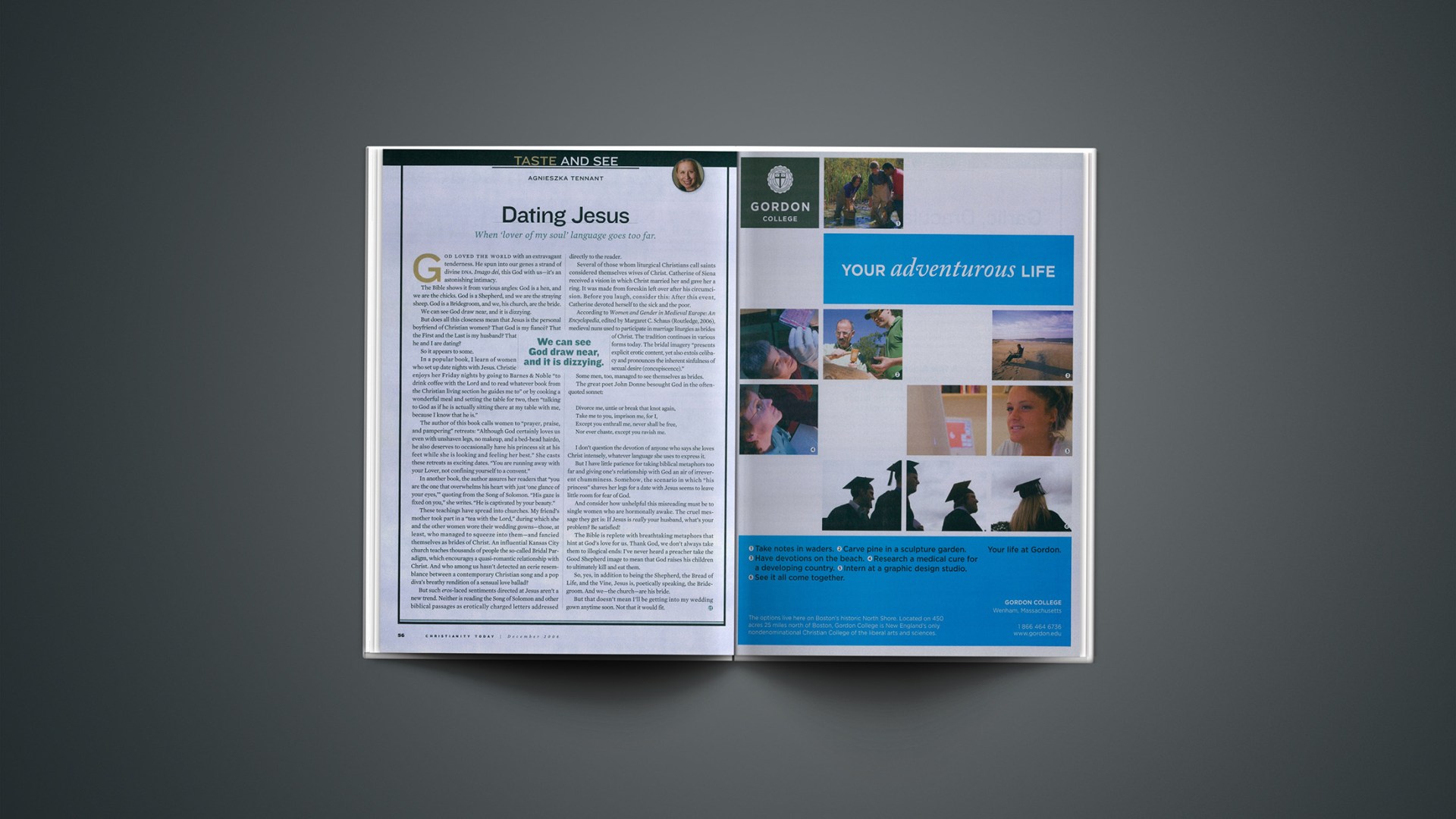God loved the world with an extravagant tenderness. He spun into our genes a strand of divine DNA. Imago dei, this God with us—it’s an astonishing intimacy.
The Bible shows it from various angles: God is a hen, and we are the chicks. God is a Shepherd, and we are the straying sheep. God is a Bridegroom, and we, his church, are the bride.
We can see God draw near, and it is dizzying.
But does all this closeness mean that Jesus is the personal boyfriend of Christian women? That God is my fiancé? That the First and the Last is my husband? That he and I are dating?
So it appears to some.
In a popular book, I learn of women who set up date nights with Jesus. Christie enjoys her Friday nights by going to Barnes & Noble “to drink coffee with the Lord and to read whatever book from the Christian living section he guides me to” or by cooking a wonderful meal and setting the table for two, then “talking to God as if he is actually sitting there at my table with me, because I know that he is.”
The author of this book calls women to “prayer, praise, and pampering” retreats: “Although God certainly loves us even with unshaven legs, no makeup, and a bed-head hairdo, he also deserves to occasionally have his princess sit at his feet while she is looking and feeling her best.” She casts these retreats as exciting dates. “You are running away with your Lover, not confining yourself to a convent.”
In another book, the author assures her readers that “you are the one that overwhelms his heart with just ‘one glance of your eyes,'” quoting from the Song of Solomon. “His gaze is fixed on you,” she writes. “He is captivated by your beauty.”
These teachings have spread into churches. My friend’s mother took part in a “tea with the Lord,” during which she and the other women wore their wedding gowns—those, at least, who managed to squeeze into them—and fancied themselves as brides of Christ. An influential Kansas City church teaches thousands of people the so-called Bridal Paradigm, which encourages a quasi-romantic relationship with Christ. And who among us hasn’t detected an eerie resemblance between a contemporary Christian song and a pop diva’s breathy rendition of a sensual love ballad?
But such eros-laced sentiments directed at Jesus aren’t a new trend. Neither is reading the Song of Solomon and other biblical passages as erotically charged letters addressed directly to the reader.
Several of those whom liturgical Christians call saints considered themselves wives of Christ. Catherine of Siena received a vision in which Christ married her and gave her a ring. It was made from foreskin left over after his circumcision. Before you laugh, consider this: After this event, Catherine devoted herself to the sick and the poor.
According to Women and Gender in Medieval Europe: An Encyclopedia, edited by Margaret C. Schaus (Routledge, 2006), medieval nuns used to participate in marriage liturgies as brides of Christ. The tradition continues in various forms today. The bridal imagery “presents explicit erotic content, yet also extols celibacy and pronounces the inherent sinfulness of sexual desire (concupiscence).”
Some men, too, managed to see themselves as brides.
The great poet John Donne besought God in the often-quoted sonnet:
Divorce me, untie or break that knot again,
Take me to you, imprison me, for I,
Except you enthrall me, never shall be free,
Nor ever chaste, except you ravish me.
I don’t question the devotion of anyone who says she loves Christ intensely, whatever language she uses to express it.
But I have little patience for taking biblical metaphors too far and giving one’s relationship with God an air of irreverent chumminess. Somehow, the scenario in which “his princess” shaves her legs for a date with Jesus seems to leave little room for fear of God.
And consider how unhelpful this misreading must be to single women who are hormonally awake. The cruel message they get is: If Jesus is really your husband, what’s your problem? Be satisfied!
The Bible is replete with breathtaking metaphors that hint at God’s love for us. Thank God, we don’t always take them to illogical ends: I’ve never heard a preacher take the Good Shepherd image to mean that God raises his children to ultimately kill and eat them.
So, yes, in addition to being the Shepherd, the Bread of Life, and the Vine, Jesus is, poetically speaking, the Bridegroom. And we—the church—are his bride.
But that doesn’t mean I’ll be getting into my wedding gown anytime soon. Not that it would fit.
Copyright © 2006 Christianity Today. Click for reprint information.
Related Elsewhere:
Previous “Taste and See” columns include:
To Russia with Fury | Sometimes charity means anger.(October 9, 2006)
What (Not All) Women Want | The finicky femininity of Captivating by John and Stasi Eldredge. (Aug. 10, 2006)
A Velveteen Apologetic | How two creatures dig a rabbit hole in my disbelief. (April 10, 2006)
What Would Jesus Buy? | Saving the world one cashmere sweater at a time. (Jan. 31, 2006)
Women and Gender in Medieval Europe: An Encyclopedia is available from amazon.com and other retailers.
The John Donne sonnet referred to above is “Batter My Heart.”










